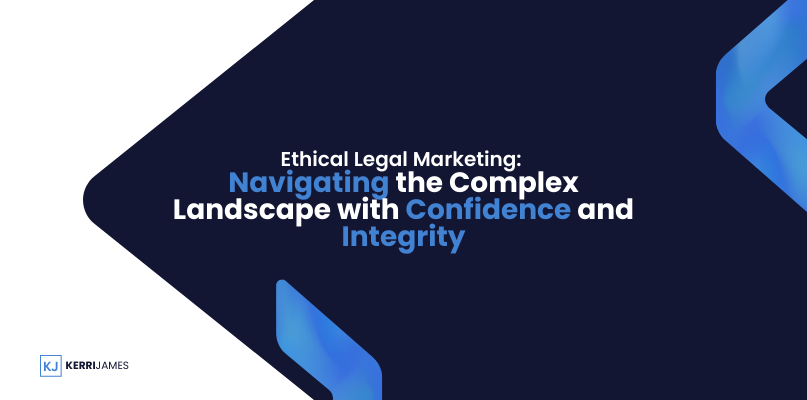In the legal profession, maintaining a strong reputation and adhering to ethical guidelines is paramount. However, as the demand for legal services grows, so does the need for effective marketing strategies. Navigating the often-confusing world of advertising rules and regulations can be a daunting task, but it’s an essential aspect of building a successful law practice. Ensuring that marketing efforts align with ethical standards is not just about compliance but also about building trust and credibility with potential clients.
In this blog post, we’ll explore the ethical considerations and best practices for creating compliant marketing content, striking the perfect balance between professional ethics and marketing goals. From avoiding false or misleading statements to ensuring truthful and verifiable claims, we’ll guide you through the intricacies of legal marketing, empowering you to promote your services with confidence and integrity. Understanding these principles is key to establishing a reputable practice that stands out in a competitive market.
Understanding the Ethical Landscape of Legal Marketing
The American Bar Association’s Model Rules of Professional Conduct
The American Bar Association (ABA) provides a comprehensive set of guidelines for legal professionals, known as the Model Rules of Professional Conduct. These rules serve as a foundational framework for ethical behavior in the legal field. One of the most critical aspects of these guidelines is Rule 7.1, which explicitly prohibits false or misleading communications about a lawyer or their services. This rule underscores the importance of honesty and transparency in all marketing efforts. Legal practitioners must ensure that their advertisements and promotional materials accurately represent their abilities and the services they offer. By adhering to Rule 7.1, lawyers can avoid potential pitfalls associated with exaggerated claims and build a foundation of trust with their audience.
To put this into perspective, imagine you’re a potential client searching for legal representation. You come across a law firm‘s website that promises a “100% success rate” in handling cases similar to yours. Naturally, this sounds too good to be true, and it probably is. If a law firm makes such an exaggerated claim, it can lead to unrealistic expectations and, ultimately, disappointment when the outcome doesn’t match the promise. Rule 7.1 is designed to prevent such scenarios, ensuring that all communications are truthful and not misleading in any way.
Navigating the complexities of state-specific regulations adds another layer of challenge. While the ABA’s Model Rules provide a broad framework, individual states often have additional or modified rules that govern legal advertising. This means that what is permissible in one jurisdiction may be prohibited in another. As such, legal marketers must stay informed about the specific requirements in their states to ensure compliance. This vigilance helps prevent inadvertent breaches of ethical standards and fosters a culture of integrity within the legal community. Understanding these state-specific nuances is essential for creating a marketing strategy that is both effective and compliant.
For example, let’s consider the difference between California and New York. California has strict rules about testimonials and endorsements, requiring disclaimers that explain the results are not guaranteed and that each case is different. New York, on the other hand, has specific guidelines about the use of trade names and requires that any nickname or moniker used by a law firm must not be misleading. Being aware of such distinctions helps legal professionals tailor their marketing strategies to meet local ethical standards.
The Importance of Truthful and Verifiable Claims
Making truthful and verifiable claims is not just a legal obligation but also a crucial component of building trust and credibility with potential clients. Exaggerated statements or guarantees can lead to unrealistic expectations and ultimately damage a law firm’s reputation. Instead, legal marketers should focus on providing accurate and evidence-based information about their services and successes. This approach not only complies with ethical standards but also enhances the firm’s credibility.
For example, instead of claiming to be the “best” law firm in a particular area, a more ethical approach would be to highlight specific achievements and client testimonials that can be substantiated. This shift from hyperbole to verifiable facts helps prospective clients make informed decisions based on reliable information. Building trust through honesty and transparency is essential for long-term success in the legal field. Furthermore, ensuring that all claims can be verified through concrete evidence or client testimonials can prevent potential legal repercussions and foster a stronger client-lawyer relationship.
Consider a scenario where a law firm advertises that it has “won millions in settlements.” While this may be true, it’s crucial to provide context. How many cases contributed to this total? What types of cases were they? Providing specific examples and details not only complies with ethical guidelines but also gives potential clients a clearer picture of what to expect. For instance, stating that “In the past year, we successfully settled 15 personal injury cases, securing over $5 million in total for our clients” is both truthful and verifiable, making it a stronger and more ethical claim.
Creating Compliant Content: A Step-by-Step Approach
Crafting Accurate and Informative Marketing Materials
Creating marketing content that is both compliant and effective requires a careful balance between providing valuable information and avoiding overt sales pitches. The focus should be on educating the audience rather than merely promoting services. Valuable content can take many forms, including blog posts, articles, videos, and social media updates that address common legal questions and concerns. By positioning your firm as a knowledgeable and helpful resource, you can attract potential clients organically.
For example, a blog post that explains the steps to take after a car accident not only provides useful information but also showcases the firm’s expertise in handling personal injury cases. Similarly, a video that outlines the process of filing for divorce can help demystify the legal process for potential clients, making them more likely to reach out for assistance.
Crafting content that addresses common legal issues or provides insight into complex legal processes can significantly enhance a firm’s reputation. For instance, a detailed blog post explaining the nuances of personal injury claims can position your firm as an expert in that field. Additionally, content that offers practical advice, such as what to do immediately after an accident, can be incredibly valuable to potential clients.
Leveraging social media and online platforms responsibly is another critical aspect of compliant marketing. Social media offers a powerful tool for reaching a broad audience, but it also comes with risks. Legal professionals must be cautious about the information they share and ensure that it adheres to ethical guidelines. This includes avoiding unverified claims, respecting client confidentiality, and providing disclaimers where necessary. Responsible use of social media can enhance a firm’s visibility and reputation without compromising ethical standards. It is also beneficial to regularly review and update social media policies to keep pace with changing regulations and ensure continued compliance.
Consider the example of using testimonials on social media. While positive client reviews can boost a firm’s reputation, it’s crucial to include disclaimers that clarify results may vary and that past performance is not indicative of future results. This transparency not only aligns with ethical standards but also helps manage client expectations.
Avoiding Coercive or Manipulative Tactics
Respecting client autonomy and decision-making is a fundamental ethical principle in legal marketing. Coercive or manipulative tactics, such as high-pressure sales pitches or misleading promises, are not only unethical but also counterproductive. Clients are more likely to choose a law firm that demonstrates respect for their independence and provides clear, honest information.
For instance, instead of using scare tactics to pressure potential clients into signing a retainer, a more ethical approach would be to provide them with comprehensive information about their legal options and the potential consequences of different choices. This empowers clients to make informed decisions based on their best interests rather than feeling coerced into a particular course of action.
Ethical considerations in client solicitation practices are equally important. Cold calling or direct solicitation can sometimes be seen as intrusive or aggressive. Instead, legal professionals should focus on creating a welcoming environment where potential clients feel comfortable seeking assistance. This can be achieved through informative content, open communication channels, and a client-centered approach that prioritizes their needs and concerns. For example, offering free initial consultations or providing detailed case studies on your website can help potential clients feel more at ease and informed about their options.
Another example is the use of urgency in marketing messages. While it’s common to highlight the importance of timely action in legal matters, it’s essential to do so in a way that is informative rather than manipulative. For instance, explaining that “acting quickly can help preserve evidence and strengthen your case” is both truthful and helpful, whereas a message like “contact us immediately or risk losing your case” can come across as coercive.
Balancing Professional Ethics with Marketing Goals
Aligning Your Marketing Efforts with Ethical Principles
Aligning marketing efforts with ethical principles ensures that client interests and professional integrity remain at the forefront. Prioritizing client interests involves providing transparent information about services, fees, and potential outcomes. It also means being honest about the firm’s capabilities and avoiding promises that cannot be kept. By maintaining high ethical standards, legal professionals can build long-term relationships based on trust and mutual respect.
Building long-term relationships through transparency is a key strategy for sustainable success. Clients appreciate honesty and clarity, especially in matters as significant as legal representation. Transparent communication about the process, potential challenges, and realistic outcomes fosters a sense of trust and reliability. This trust translates into client loyalty and positive word-of-mouth referrals, which are invaluable assets for any law firm. Additionally, transparency in billing practices and clear explanations of legal fees can further enhance client trust and satisfaction.
For example, a firm that clearly explains its fee structure, including potential additional costs and the circumstances under which they might arise, demonstrates a commitment to transparency. This can be contrasted with a firm that only provides vague or incomplete information about fees, which can lead to misunderstandings and dissatisfaction.
Strategies for Effective and Ethical Legal Marketing
Leveraging thought leadership and valuable content is a powerful strategy for ethical legal marketing. By sharing insights, expertise, and practical advice, legal professionals can position themselves as thought leaders in their field. This not only attracts potential clients but also enhances the firm’s reputation. Thought leadership can be demonstrated through blogs, articles, webinars, and speaking engagements that address pertinent legal issues and trends. Participating in industry conferences and contributing to legal publications can further establish your firm as a leader in the field.
For instance, a lawyer who regularly writes articles on recent legal developments or trends in their area of expertise can build a reputation as a knowledgeable and trusted resource. Similarly, hosting webinars on common legal issues or changes in the law can attract potential clients and showcase the firm’s expertise.
The Legal Marketing Association (LMA) provides a wealth of resources and best practices for effective and ethical marketing. Leveraging LMA’s guidelines can help legal professionals develop robust marketing strategies that align with ethical standards. These best practices include creating client-centric content, maintaining a strong online presence, and utilizing data analytics to measure and improve marketing efforts. By integrating these strategies, legal marketers can achieve their goals while upholding the highest ethical principles. Additionally, staying updated with the latest trends and advancements in legal marketing can provide a competitive edge while ensuring compliance with ethical guidelines.
For example, using data analytics to track the effectiveness of marketing campaigns can help identify what works and what doesn’t. This data-driven approach allows for continuous improvement and ensures that marketing efforts are both effective and ethical.
Final Word
Navigating the ethical landscape of legal marketing is undoubtedly challenging, but it is essential for maintaining a reputable and successful practice. By adhering to the ABA’s Model Rules, making truthful and verifiable claims, and respecting client autonomy, legal professionals can create compliant and effective marketing content. Aligning marketing efforts with ethical principles ensures that client interests and professional integrity are prioritized, fostering long-term relationships based on trust. By leveraging thought leadership and valuable content, legal marketers can achieve their goals while upholding the highest ethical standards. With the right approach, legal professionals can confidently promote their services with integrity and success. Ethical marketing not only enhances a firm’s reputation but also contributes to the overall betterment of the legal profession.










